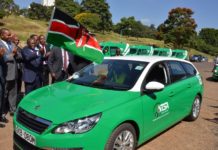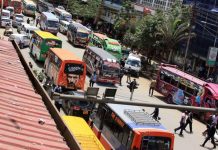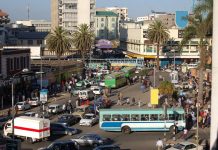At his garage at Bunga, Peter Amadi wears a navy blue overall. It is a beehive of activity; from cars being sprayed, to those whose dashboards are being dismantled for gear correction. The mechanics involved at every stage are those Amadi has trained overtime.
Amadi’s car service and maintenance is a journey that stretches back to 1989, when as a young man, he took on a part-time job with a tour firm, while studying at Kenya Industrial Training Centre (KITC).
“The owner of the tour firm had a friend at Subaru Kenya. He noticed that I loved cars. When I completed college, he promised to take me to his friend and in January 1989, he fulfilled his promise. I was employed by Subaru Kenya the same day,” Amadi recalls.
At Subaru Kenya, Amadi worked in the main maintenance department. He did general car servicing and diagnostics up to 1993. The same year, the company started assembling Subaru cars in Mombasa where he simultaneously assembled cars and returned to Subaru Kenya to continue working until 1996 when he was transferred to the sales department. In the department, he was responsible for inspection, diagnosis and maintenance of new cars before and after sale. As fate would have it, in 1993, Amadi met a team from the World Rally Championship (WRC) in Kenya.
Experience
From 1990 to 1996, he serviced Subaru cars for local rallies such as those on the Sportsman Rally Team and 555, among others. He also serviced cars for rally drivers such as Richard Barnes and Peter Solberg, among others, until 2000 when he came back to Uganda.
“Servicing cars gave me a real experience in the motor industry. There were times when four World Rally Championship cars arrived into the country and needed testing and set up. At the same time, there were 40-feet containers full of Subaru parts to test parts such as tyres before the main safari rally. It was the toughest on the World Rally calendar,” he recalls.
Under Allan Webster, his then boss, Amadi was part of the four-man team from Subaru Kenya. He was the only technical person who serviced cars in the field as the rest helped in keeping the workshop clean.
“That is how I made my name and became famous under the WRC. It was at that time that every local rally driver in Kenya was looking for me to service their car,” Amadi says.
The renaming of Subaru Kenya meant that the company had to open up branches all over East Africa. In January 2000, the company zeroed in on Amadi as the right candidate to come to Uganda under Kampala Motors. After moving around and getting a printout from revenue authorities, Amadi discovered there were only nine Subaru cars in Uganda. Out of the nine, only five were on the road. While he thought motorists needed promotional materials such as T-shirts and caps to notice the Subaru brand, he later discovered that they were interested in car rallies.
“As a new company, we went to Wavamunno Broadcasting Services (WBS) who organised a small show at Sheraton Hotel in Kampala. It went on well and it introduced Subaru on the local market,” Amadi recounts.
After the show, he embarked on looking for clients. In the first two years, he did not do anything technical. He became the marketing manager of Subaru. What shocked him was that he could only see brand new Toyota cars belonging to embassies, ministries and non-governmental organisations, but not individuals. His aggressive marketing methods saw him go back to revenue authorities to get data of the number of NGOs and ministries in Uganda and the type of cars they bought.
After a lot of convincing, the Finance ministry bought the first Subaru Impreza while Shell Uganda bought the Subaru Outback. After six months, the company sold nine Subaru Foresters to the Finance ministry and three to National Water and Sewerage Corporation. The Public Procurement and Disposal of Public Assets Authority (PPDA) also chipped in and also bought six Subaru cars as the Defence ministry bought 10.
The major breakthrough was in 2006 when the company sold two Subaru Outbacks to President Museveni’s office to be part of his convoy. It was then that motorists started understanding the beauty of the Subaru. During CHOGM in 2007, Subaru sold 90 cars to Uganda police, a moment Amadi recalls as his happiest. In late 2000, motorists started importing Subarus but looking out for those that resembled the ones that belonged to police.
Starting Dalas Auto Clinic
After 24 years of servicing and maintaining cars at Subaru Kenya and Kampala Motors, Amadi opened Dalas Auto Clinic in 2013 in Kibuli, before relocating to Bunga.
“I left Subaru to start my own garage. I wanted to transfer the experience I had gained from Subaru Kenya and Kampala Motors to my own workshop. I also wanted to train people on how to service Subaru and Toyota cars. I train them for free as long as they are willing to learn,” Amadi explains, adding that he receives students from universities and vocational institutes and that when they complete their courses, he helps them look for garages where to work depending on how they perform.
Bridging the gap
Trust and loyalty matters most in the motor industry and it is something that Amadi found demanding in Uganda. Being straight forward with clients is a character Amadi says he instils in his trainees.
“The best advice to mechanics is to stop cheating clients. A client pays for a spare part of Shs2m and the mechanic goes to Kisekka market to buy it at Shs100,000. After two days, the car is into another garage. It is a problem and it is happening among a number of mechanics because they are hungry for money,” Amadi observes.
Challenges
In the motor industry, Amadi argues that motorists believe that the newer the number plate, the newer the vehicle. If you tell someone that you have a car for sale, the first question they will ask is about the number plate, not the condition of the car. He has maintained his Turbo Subaru Forester UAJ 538S, with a speedometer of up to 240 kilomters since 2006 but it is in a better condition than those of UBA series. He uses it as an example to teach people how to maintain their cars.
“After looking at it, people now prefer to have their cars well maintained than running to bonds. If you want to buy a car from anywhere, I test it for you at no cost and advice on what to do,” he says.
Do it yourself
As a car owner, Peter Amadi advises that there are some things you must do yourself. These include checking the brake and steering wheel fluid, master cylinder fluid and the deep stick for engine oil levels. The problem is that as long as your car can start, you’ll always believe that it is in a stable condition. Sometimes the rubber boots are torn and the gearbox mountings and other parts are broken.
“When you go to the garage and they give you a bill of Shs5m, you think they are cheating you yet it was your fault. Have a habit of visiting a garage for regular checks even when your car is not faulty,” he concludes.
Who is Peter Amadi.
Amadi is the fifth born in a family of eight children. He was born in 1963 and studied in Kenya at Igakala Primary School and Raval’s Secondary School and later at Kenya Industrial Training Centre (KITC). He is currently studying an executive MBA at Virtual University of Uganda.








![Top 20 Used Cars to Avoid Buying in Kenya – [PHOTOS]](../../../blog/wp-content/uploads/2013/11/top-used-unreliable-cars-to-avoid2-80x60.jpg)

![Top 20 Used Cars to Avoid Buying in Kenya – [PHOTOS]](../../../blog/wp-content/uploads/2013/11/top-used-unreliable-cars-to-avoid2-100x70.jpg)





